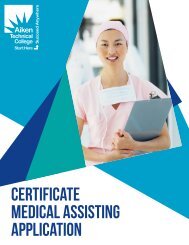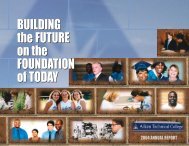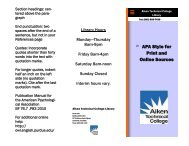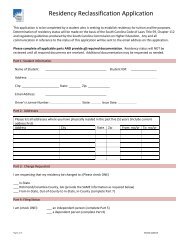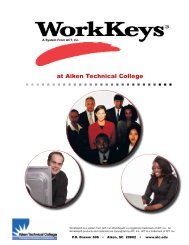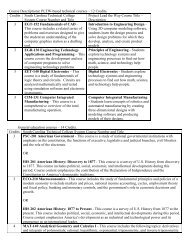2009 Accountability Report - Aiken Technical College
2009 Accountability Report - Aiken Technical College
2009 Accountability Report - Aiken Technical College
You also want an ePaper? Increase the reach of your titles
YUMPU automatically turns print PDFs into web optimized ePapers that Google loves.
17<br />
The Planning and Research Office produces quantitative and qualitative data to support fact-based decision<br />
making and disseminates data to end users on an ongoing basis. Student enrollment, grade distribution, degree<br />
completion, graduation rates, pass rates on licensure/certification examinations, student engagement, student<br />
evaluation of course and instruction, retention and persistence, transfer, and job placement represent the type of<br />
data available on a regular basis.<br />
The <strong>College</strong> conducts the Community <strong>College</strong> Survey of Student Engagement (CCSSE) on an annual basis to<br />
provide useful information on student engagement and satisfaction. In the Fall of 2008, the <strong>College</strong><br />
administered the Survey of Entering Student Engagement (SENSE) for the first time gauge the level of student<br />
satisfaction and engagement within the first six weeks of the semester. Results from the <strong>2009</strong> surveys<br />
regarding students’ evaluation of their overall educational experience at ATC are found in Category 7. Senior<br />
leaders also regularly review MAPP results which are used to measure general education courses for student<br />
proficiencies.<br />
III.1.9. How does your organization address and anticipate any adverse impacts of its programs, offerings,<br />
services, and operations What are the key compliance related processes, goals, and measures<br />
Risk management, privacy and internal auditing procedures are routinely used to identify adverse risks. The<br />
Vice President of Administrative Services and the Risk Management manager annually determine a short list of<br />
critical <strong>College</strong> functional areas that will be subject to review by the internal audit team during the fiscal year.<br />
The results of the internal audits, including any recommendations for corrective action, are presented to the<br />
President in a report document. Legal counsel is regularly sought as part of due diligence practices in areas such<br />
as personnel and contracts. An annual financial audit is conducted by an independent auditing firm. The <strong>College</strong><br />
has received “unqualified opinions” from its independent auditors since inception. In addition, the State<br />
conducts annual audits for the awarding of continuing education credits and inventory finding few, if any,<br />
exceptions. The <strong>College</strong> participates annually in the South Carolina Human Affairs Commission audit of hiring<br />
practices and has scored in the top group of state agencies for the past several years.<br />
In addition, within the past five years the <strong>College</strong> has participated in a federal Program Review of its Financial<br />
Aid programs, a SBTCE Management audit, annual state FTE and Residency audits and annual state Financial<br />
Aid and Veteran Affairs audits. The <strong>College</strong> routinely has minimal findings in these regular reviews.<br />
Lastly, through the <strong>College</strong>’s annual program review process, academic programs are evaluated and<br />
enhancements are made to strengthen viable programs and to delete non-viable programs. Where appropriate,<br />
the <strong>College</strong> seeks individual program accreditation and is accredited by the Commission on <strong>College</strong>s of the<br />
Southern Association of <strong>College</strong>s and Schools to award Associate Degrees. These latter processes involve an indepth<br />
review of the <strong>College</strong>’s programs, offerings, services and operations.<br />
III.1.10. How do senior leaders actively support and strengthen the communities in which your organization<br />
operates<br />
Senior leadership is actively involved in community organizations, such as Rotary International, Chamber of<br />
Commerce, Workforce Investment, Regional Education Center, Heart Walk and United Way boards. Student


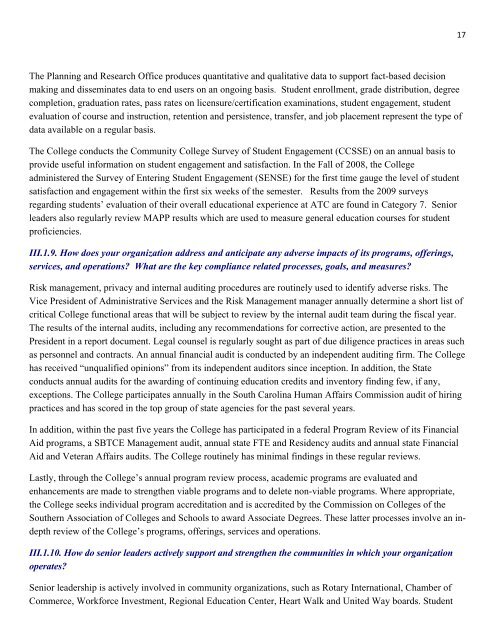
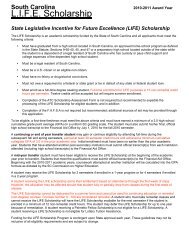
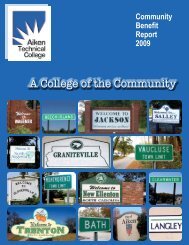
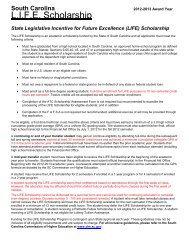
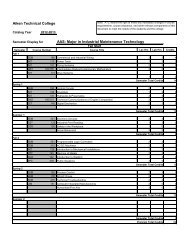

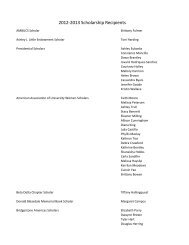
![MLA PowerPoint presentation [PDF] - Aiken Technical College](https://img.yumpu.com/36398339/1/190x143/mla-powerpoint-presentation-pdf-aiken-technical-college.jpg?quality=85)
